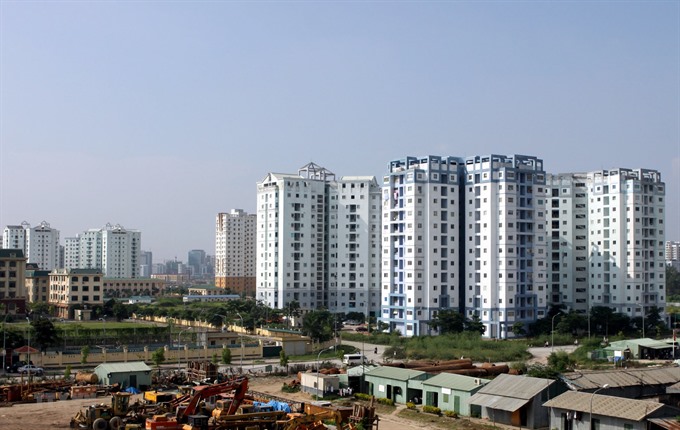 Society
Society

Hà Nội residents are struggling to find houses because the city is still lacking of social housing projects and some of them have been halted by capital shortage.
 |
| A part of the Nam Trung Yên urban area in Hà Nội. Several apartments in the area remain unoccupied despite having been built a decade ago. — VNA/VNS Photo Tuấn Anh |
HÀ NỘI — Hà Nội residents are struggling to find houses because the city lacks social housing projects, with some projects currently being halted due to a lack of capital.
Meanwhile there is no shortage of resettlement houses, with thousands of homes abandoned, causing waste to the Stage budget.
According to the latest report of the Hà Nội Housing Development and Management Company, it has 166 resettlement buildings with a total of 14,211 apartments.
Of which 13,111 were already paid for by homeowners, with the remaining 1,100 uninhabited.
Some resettlement buildings have been left empty for more than ten years in Long Biên District’s Sài Đồng Ward, surrounded by fields of grass and garbage. The complex’s facilities, including electronic cabinets and hygienic equipment, have degraded due to unuse and lack of maintenance.
Three buildings in Bắc Từ Liêm District have been staying vacant since they were completed in 2014.
Similarly, the 20-floor apartment block in Hai Bà Trưng District’s Tạ Quang Bửu Street is still uninhabited although it was built more than ten years ago.
The reasons
Nguyễn Đắc Thảo, deputy head Urban Management Office under the Hà Nội Construction Department, told Hà Nội Mới (New Hà Nội) newspaper that many households are not interested in resettlement apartments due to low quality and poor management.
Hoàng Thế Anh, a resident living in Nam Trung Yên urban area, complained to Thời báo Kinh Doanh (Business Times) newspaper about the low quality of the apartments, with cracks and peeled mortars covering the walls on the inside while moss grows rampant outside the house.
“In my apartment, the toilet breaks twice a week and fire safety equipment fails to meet standards,” Anh said.
Degradation and poor quality is the leading reason contributing to the vacancies in settlement houses, according to lawyer Trương Thanh Đức from Banking-Securities-Investment Law Co., Ltd.
Inconvenient locations of the housing and lack of accompanying social infrastructure such as hospitals or schools also reduce the attractiveness of the settlement houses, he said.
“Many do not want to move because their designated apartments are located on high floors, preventing them from easily running businesses like setting up shops.”
In addition, many house traders just buy resettlement houses at low prices only to flip them later to earn profits.
“The first beneficiary must be people in need of resettlement when we renovate the city, not a buy-to-sell trader," said architect Ngô Viết Nam Sơn from Ngô Viết Group.
Inappropriate compensation was also why resettlement buildings were abandoned in Hà Nội, he said.
Many land clearance projects have been lagging behind schedule. Since residents see no progress in construction, they refuse to leave their old homes to move into the resettlement houses.
It is hard for residents to part with their land for a place far from the main road, not to mention giving up their business locations while their children must travel long distances to attend school.
According to the regulations of Hà Nội People’s Committee, residents can receive financial compensation instead of a resettlement apartment if they opt for that option.
The department will withdraw the unclaimed apartments for other projects that will need resettlement.
In 2017, Urban Management Office retrieved 41 apartments because residents chose to receive compensation instead. — VNS




